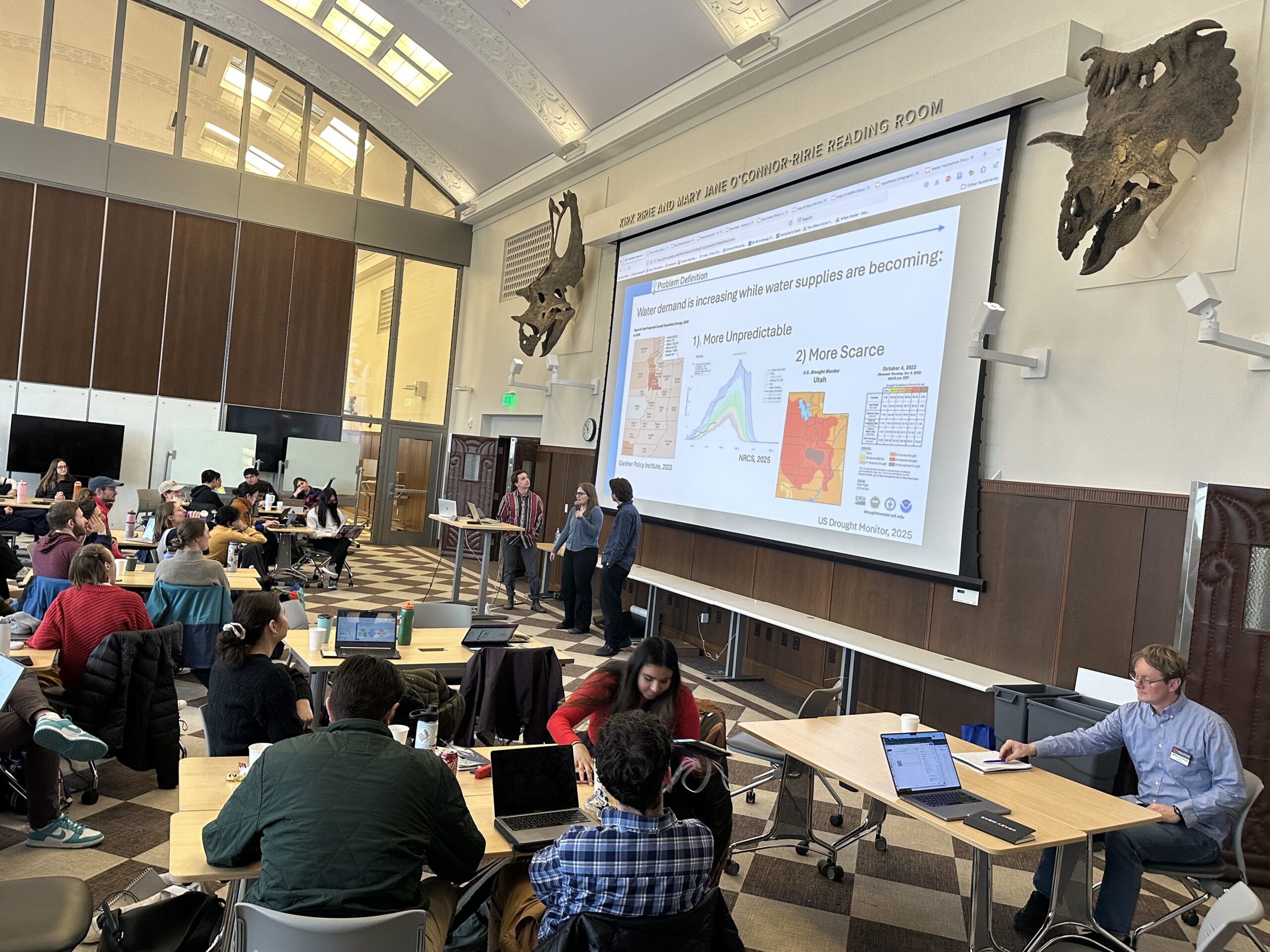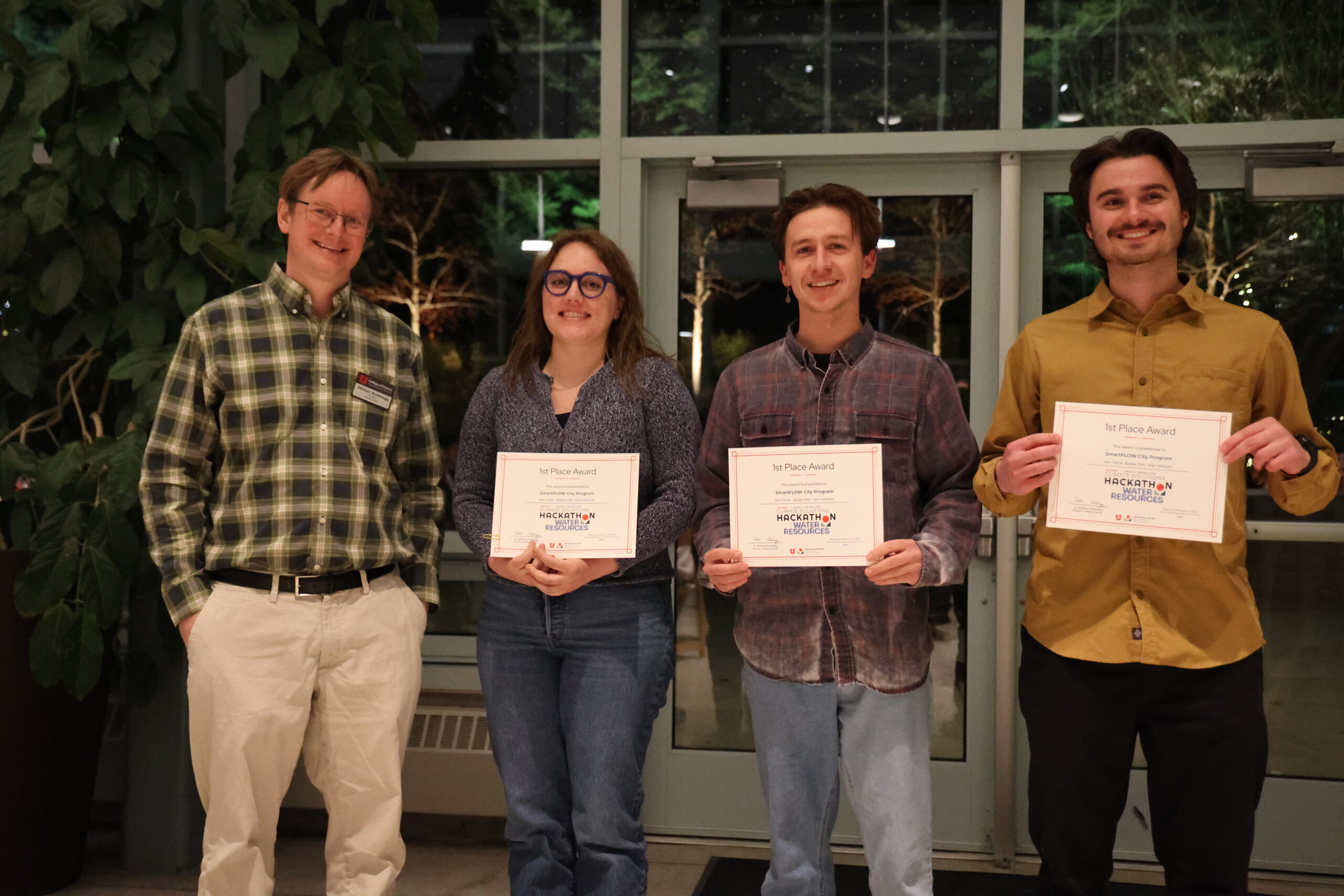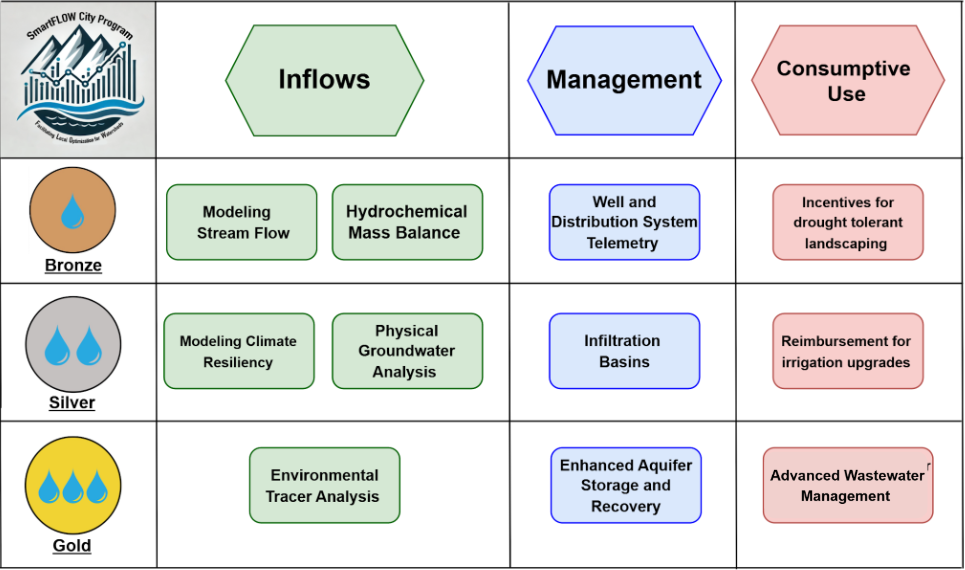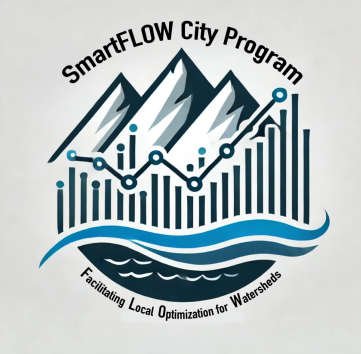
The Wilkes Center recently hosted its 3rd annual climate solutions hackathon at the end of January. This year the focus was water resources. The “hackathon” as we’ve come to call it – borrowing the term from the computer coding world – is an intense problem-solving competition where we challenge U of U undergraduate and graduate students from any discipline to team-up and develop proposals in a slide deck within 24 hours.
We asked students to propose an innovative, data-driven solution in one of five categories:
- Municipal Water Supply
- Inland and Coastal Flooding
- Agriculture
- Drought
- Water and Energy Infrastructure
Ultimately, each team was graded on how we they addressed important factors, such as: Problem definition and analysis; Uniqueness and innovation; Idea feasibility; and Implementation and scalability. Over 90 students participated in this year’s water hackathon, with 17 impressive projects submitted by the end. Only the top 3 teams were received awards. And recently, I spoke with the team members of the winning team, whose members include:
Sam Carter, Baylee Olds, Tyler Yoklavich — each of them graduate students studying hydrology. Their hackathon solution – titled “SmartFLOW City Program” formulated a program to connect municipal water managers with water researchers in academia. Essentially, they envisioned a program to encourage cities to enhance their water-resilience tool box with various cutting edge techniques being developed by folks in academia. Bridging on-the-ground management and emerging modern science.
So, here’s my conversation with Team SmartFLOW. I hope you enjoy it.
(Featured image: The SmartFLOW team presenting their proposed solution at this year’s Climate Solutions Hackathon)
Listen to the Interview:
Transcript:
Ross Chambless
So, welcome, everyone, to the Wilkes Center. Let’s go around and have each of you introduce yourself and say what is your field of research.
Tyler Yoklavich
Yeah. My name is Tyler Yoklavich. I’m a graduate student in the Department of Geology and Geophysics, and I study groundwater. I mostly study using environmental gases to age-date groundwater. Figure out how old it is. That tells us something about how much water is in a given system, and therefore the sustainable yield for a catchment.
Ross Chambless
Okay, interesting.
Baylee Olds
I’m Baylee Olds. I’m also in the geology department working on snow hydrology. So how much of our snowpack we lose to the atmosphere and how we can manage our forests to potentially maximize water yields.
Sam Carter
Hey, I’m Sam Carter. We’re all in the geology department, and so we actually share an office together.
Ross Chambless
Oh, you do?
Sam Carter
To reiterate, Geology and geophysics. I’m a master’s student, also studying groundwater, doing a lot of the same techniques that Tyler’s doing, but kind of applying these environmental tracers, as we call them, or geochemical isotopes and different kind of chemical signatures in water to understand its age and its history. And my research pertains to Great Salt Lake, trying to understand how much groundwater is feeding Great Salt Lake, because that’s kind of a missing part of the water budget. And of course, with recent years kind of it drying up, it’s just been super important to understand all the inputs.
Ross Chambless
Definitely. A lot of attention on that topic right now. And so you all know each other. You knew each other going into this event, too.
Tyler Yoklavich
We did.
Ross Chambless
Yeah, so then, did you have a sense of what you wanted to tackle as far as your solution going into the event, or was it sort of spontaneous?
Baylee Olds
We knew we wanted to draw on our backgrounds, but we definitely didn’t have a plan going in. I feel like we went to lunch and just brainstormed and then.
Sam Carter
We weren’t totally sure how narrow the prompts would have been, if it was kind of broader versus more specific. But we knew we had a pretty diverse background in hydrology and water resources and stuff like that and wanted to integrate our disciplines, but kind of kept it broad. And I think we did that pretty well.

Ross Chambless
Yeah, cool. Well, I should have mentioned this at the beginning, but congratulations on taking first place with the hackathon! Your idea was really interesting, and your presentation was great too. And so, I guess I wanted to just go through a little bit of your slide deck and talk about how you set up the problem. You know, here’s the challenge that you’re taking on: water demand is increasing, while water supplies are becoming more unpredictable, more scarce, and harder to manage. So, why did you decide to set up your slides this particular way?
Baylee Olds
I think it’s important to provide background. We not only want to do good research, but also be problem oriented. So if our whole point is finding a solution, we have to really understand the problem and where the need lies. So our project was really focused on what our current problems are.
Ross Chambless
I think you did a good job! I think the graphics, the mapping and the data really are helpful for that. I also want to just go down to this particular topic, on page number eight. I thought that was really interesting because you identified what you see as a gap between accessing the raw data and applying or translating that into useful data that can be applied by water managers. That’s really interesting. So, you say more about that.
Tyler Yoklavich
Yeah. I think something that kind of became apparent when we were working on this that I find interesting is when we think about climate resources or climate change and addressing these problems, we want to think about these huge geoengineering solutions that will be like the one-fix-all solution. In our brainstorming, something we identified that we also talk about a lot in our department is that we actually don’t really have a shortage of solutions when it comes to water resources. Of course, there’s a lot of cutting edge stuff that is still to come, but there is a variety of very cutting edge and very useful techniques that have been developed here in academia.
It seems like the broader issue is bringing those things into the management realm. So we got a whiteboard and put up all of these ideas we have about, “Oh, it would be great if municipalities employed the stuff that Sam and I work on (the environmental tracer work) or the modeling work that Bailey has been involved with!” But the real issue seems to be setting up a structure that brings those things to municipalities. And so I think that was kind of the main issue that we identified. If you guys agree that’s where we were going with that slide.
Sam Carter
I think it’s kind of a broader problem, too, when you look at all the political spectrums, there’s all of the places where we have all these court rules, but we need to be able to apply them. So we threw all of our expertise on the board and we were like, “Oh, this is cool,” but each one on its own is kind of meaningless in a way. You need a way to integrate that together and then make it useful for people who are actually in the water realm.
I did some work between undergrad and grad in consulting and stuff. The fact that there’s such a disconnect between the management and the actual science. And so I think that ‘science communication gap’ kind of speaks to the problem we identified and then kind of fed into how we went about trying to come up with a solution.
Ross Chambless
Yeah, because obviously you’re all associated with academia right now. But it sounds like you also have had experience working with municipalities, whether it’s watershed or hydrology in some form. So you’ve kind of gotten a sense of that ‘gap’ from your own experiences.
You started to identify how the best utilization of this data to make it effective might be to set it up in a way that municipalities can actually use and set goals for themselves. Can you talk about that? How did you come around to deciding to ultimately set it up as this incentive program?
Tyler Yoklavich
Like we discussed, we’ve all worked with municipalities, and at least in my experience, water managers are very interested in using these tools. But there is that gap. So we wanted to propose a program that would try to bridge that gap via the State Department of Environmental Quality and couple it with the work that municipalities already do for drinking water source protection and for Clean Water Act compliance. On top of that, we wanted to give them a reason to participate beyond interest, but also have some kind of an incentive, whether it’s financial or even just making things easier on them from a regulatory perspective.
Sam Carter
Also, I feel like there is kind of a difference in scope between academia that has the scope of: Let’s gather knowledge for the greater good, for the sake of understanding and protecting ecosystems and stuff like that. But then, water managers have a scope of: I just need to get my water to my people. So we tried to create something that’s incentive based that would encourage these water managers to use these techniques.
But they can also contribute to broader academic understanding. In the future slides, we talk a little bit about this kind of open source data system. Sorry to jump ahead, but I just think that all kind of contributed to that question of, “How can we incorporate all these aspects in and make it so everybody is benefiting?”
Ross Chambless
Yeah, absolutely. Well, I think the way you laid it out as a progression having the inflow, the management, and the consumptive use, anchored how you were going to outline these goals and ultimately allow cities to increasingly add on to their water managing capacity, and allow them to compare the best practices of what’s being done by other cities.
What else do you feel like is critical to understand as far as your proposal here?

Tyler Yoklavich
I think the general layout of having multiple tiers was something that we found interesting. We wanted it to be flexible to accommodate different types of municipalities, like comparing Salt Lake City to Saint George, or comparing Saint George to a smaller municipality with less funding. We came up with a bronze, silver and a gold tier. Bronze starts with low cost, easy to implement solutions. Higher tiers work up to more complex, more costly solutions that give you a more robust understanding of the water system but maybe require a bit more expertise. So we also had the incentives escalate as municipalities work their way up the tiers.
That was something that I thought was important: flexibility. We tried to think about how this could be a system that would work for different types of challenges, whether municipalities think, “We have issues with our groundwater; we want to know how much groundwater we have!” or, “We don’t even use wells.” Allowing them to choose between different solutions and different tiers and then hopefully progress as the years go on. Starting at a bronze tier and then finding success in moving their way up in that system was something that I was proud of.
Ross Chambless
Yeah. I know you focused this by primarily looking at the state of Utah, but it also seems broad enough that it could be applicable to other states or other cities beyond that, depending on how they wanted to arrange that. So that seemed like a bonus as well. I’m just curious, have you ever presented these, or do you have any intention to present this to state regulators?
Tyler Yoklavich
I thought that might be fun. I think we came into this for the competition and for the experience, and then I left it thinking, “This could actually be a very useful idea.” It would be interesting to present to somebody at the Department of Environmental Quality and see if there’s a version of this that could actually be something we implement. There were other projects who discussed agricultural water optimization, The Water Use Optimization Task Force that the state of Utah has put millions of dollars into, and the potential effectiveness or ineffectiveness of that program. So it seems like there is money involved that goes into solutions like this, so maybe this actually could be a feasible idea. What do you guys think?
Baylee Olds
If you want to, you know where we are.
 Ross Chambless
Ross Chambless
Right. Well, certainly, I agree. I think you highlighted that there are existing opportunities for funding, and there are programs existing with the state and other municipalities here within the state of Utah that potentially could use this. And that is also an ongoing discussion, as far as why we engage in these sorts of activities, about where this can be sort of fun and generate ideas. But does any of it actually become real and could it become real? And if so, how, right? How does that sort of commercialization process happen? How do you actually translate this into an actual thing? I think we’re all really interested in that too. So I would definitely encourage you all to try that. Just try to shop your idea around to the DEQ or the legislature or whoever else to see if they’re interested.
Sam Carter
Yeah. You know, one of the challenges is that everyone at the Hackathon has their own little respective backgrounds. I really admired a lot of the people who seemed a little bit more policy based and seemed a little more focused on the actionable stuff. I think that they hit home on all those points. But then, of course, me with a science background, I was kind of critiquing like, “Okay, well, they didn’t really think about this or that or whatever.” And I’m sure they were doing the same thing to me, right? I feel like that’s because of our background. We have the science pretty dialed, but like, how do I bring it to a legislator? Like, I have no idea, right? So I think that just kind of emphasizes the collaboration that’s actually needed to turn these things into reality.
Ross Chambless
I mean, yeah, absolutely. I think that’s what’s kind of nice about it is you have all those different perspectives, right? You have people with different strengths and backgrounds and awareness of how things might work out in a certain way. And so bringing all that expertise together, you can get some really interesting things coming out of it. Really cool.
Well, I just want to ask you a couple more questions and I’ll let you all go. I also just wanted to ask about your overall experiences with this event. How was your experience, and did you see any room for improvement? Please, I welcome your brutal honesty!
Sam Carter
I think we all had a really awesome experience with regards to what we just talked about with the collaboration aspect and stuff like that. It’s funny, we all share an office together, right? We’re all friends. We’re all co-workers and stuff like that. But we had never undergone this kind of collaboration before, even sitting right next to each other. Of course, we ask each other the occasional question about their respective research, but that’s it. I think my favorite part about this was it really forced us to talk about these things and integrate our research and also just integrate our various skills and thoughts and perspectives. I thought the collaboration, even amongst people who I already knew, was such a cool way to learn from them and to learn more about my individual skill sets and stuff like that. So I really liked the event more than I thought I would. We went into it thinking, “We’re going to spend 6 hours doing it, then we have what we have and we’re going to stop.” We ended up working threefold what we thought we would because we were super invested. I think we had a lot of fun.
Tyler Yoklavich
We totally got sucked in. Yeah.
Ross Chambless
Nice.
Tyler Yoklavich
To build on that, it was fun. First of all, you have to have that kind of collaboration. But there was something else that I found to be a useful exercise; we spend a lot of time thinking about very niche problems for a very long time. Like a master’s thesis or a Ph.D. is one tiny little slice, really getting into the minutia of it. So this was a different kind of thought experiment where we took a very broad problem and tried to come up with a solution very quickly. That’s not something that we practice in academia or in anything else that I’ve done, other than crunching for an exam or something. But it was definitely just a different way of thinking about water resources. And I found that it was actually very helpful and interesting.
Ross Chambless
Yeah, that’s really helpful to hear. It definitely has this sort of wild aspect to it because we never know what’s going to come out of this. So much of it is just unpredictable and unplanned and you just sort of try to set up certain parameters and then just let everyone run wild and see what comes out of it. And sometimes you have brilliant things. I think it’s brilliant. There’s certainly a lot of other great ideas that emerged from the Hackathon, and I think that’s hopefully something. My hope is that a lot of this does stimulate good ideas, but also some of this could actually become something feasible. And if it’s applied right, might make the world a better place.
Any other final thoughts that you might want to add to your experience or whether you think this might advance your own personal career goals in this area?
Tyler Yoklavich
It definitely made me think about experiences I’ve had in a different way, which I think will be useful in the future.
And we didn’t have coffee on the final day, or water, so…That might not be good for the podcast, but that’s our complaint! We were getting ready to go up there and we were like, “Ooh, I need some water, I need some coffee before I present.”
Ross Chambless
That is so true!
Baylee Olds
I do wish that there were longer presentation times. I hate presentations, but science communication is the whole point, right? Especially with our presentation. So I would have liked to hear everybody’s slides, I’m excited to look at everybody’s slide deck. But 4 minutes is a really short amount of time to present, especially our project. We really glazed over it.
Ross Chambless
Yeah. Okay. I appreciate that! That’s good to hear. And that is a very difficult thing to ask of any team, to slim down your presentation. So, yeah, noted.
Baylee Olds
At the same time, I can see where the 4 minutes is useful. My advisor is always telling me to keep it concise, hit your key points. So I do think that there is some benefit to it as well. It got us to really focus our message and our story and our point.
Sam Carter
I think consolidation is a skill set in its own right. Looking back, the 3 hours of sleep, probably affected our ability to think through the presentation. If we were to do it again, I think we would have taken a different approach during the presentation. Instead of trying to explain the elaborate connections in the system and stuff, I think we could have given a simple case study. I really think that’s a skill on its own, being able to just totally summarize 37 slides or whatever into a four minute talk. It’s challenging. But again, there were all these little mini exercises in the big exercise that I think were really, really interesting.
Ross Chambless
Yeah, great. Well, Sam Carter, Baylee Olds, Tyler Yoklavich, thank you so much for making some time to talk!
Tyler Yoklavich
Thank you.
Baylee Olds
Thanks to the Wilkes Center for doing everything!
Tyler Yoklavich
Yeah. It’s a great event.
Sam Carter
And thanks to everybody that helped organize, it was awesome.
Ross Chambless
Awesome. Thank you.